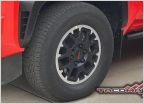-
Welcome to Tacoma World!
You are currently viewing as a guest! To get full-access, you need to register for a FREE account.
As a registered member, you’ll be able to:- Participate in all Tacoma discussion topics
- Communicate privately with other Tacoma owners from around the world
- Post your own photos in our Members Gallery
- Access all special features of the site
You shouldn't use 86 or 85 grade gas, right?
Discussion in '4th Gen. Tacomas (2024+)' started by malatx, Feb 7, 2024.
Page 3 of 4
Page 3 of 4


 Rear seat covers for dogs.
Rear seat covers for dogs. Smartcap Adventure Topper
Smartcap Adventure Topper Center console removal
Center console removal 4th Gen Wheels
4th Gen Wheels Receiver hitch storage solution.
Receiver hitch storage solution. Rough Country price increase
Rough Country price increase














































































